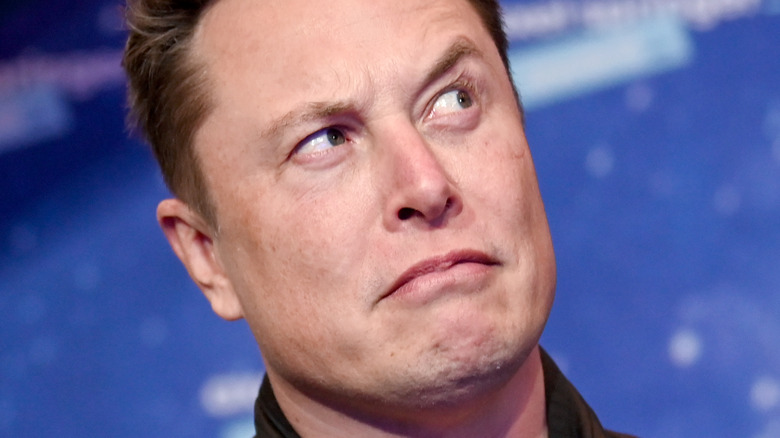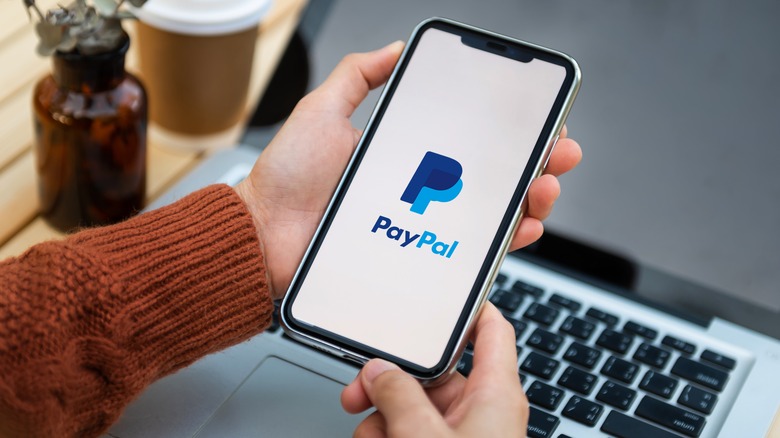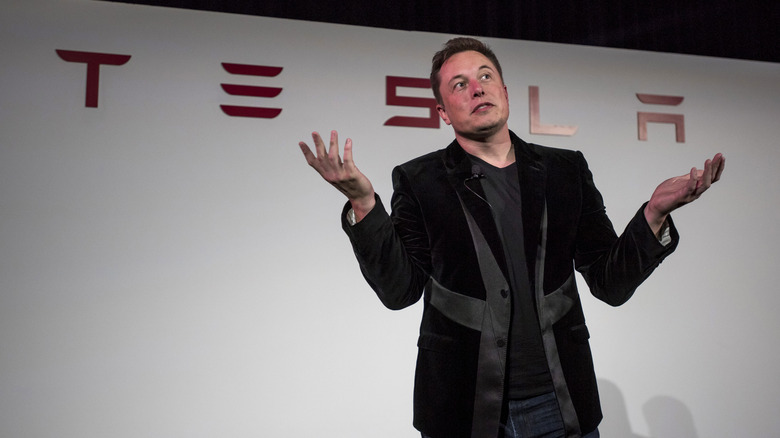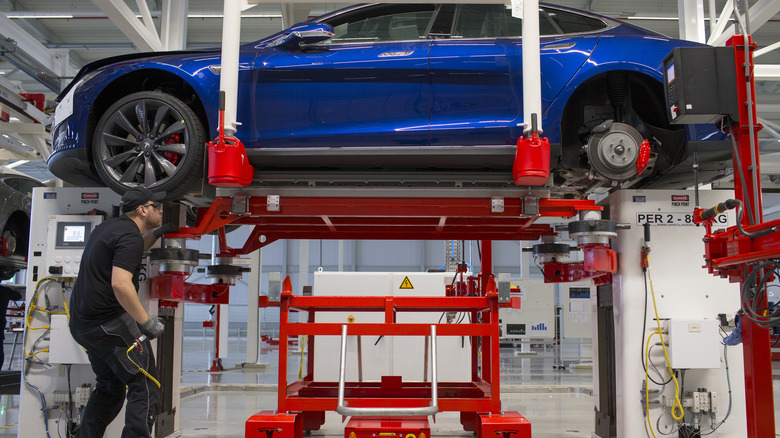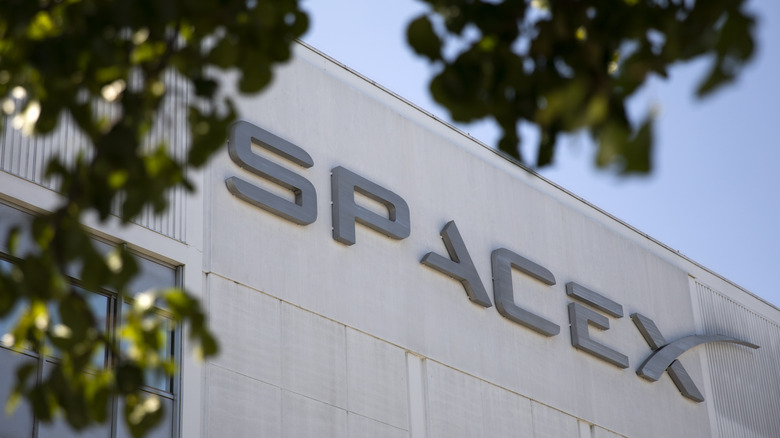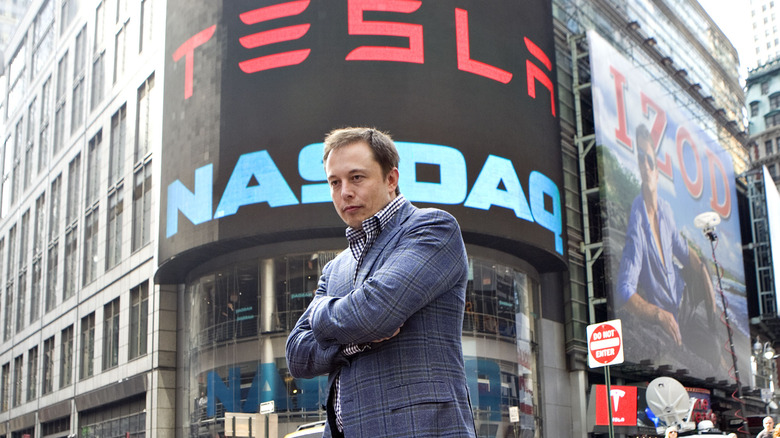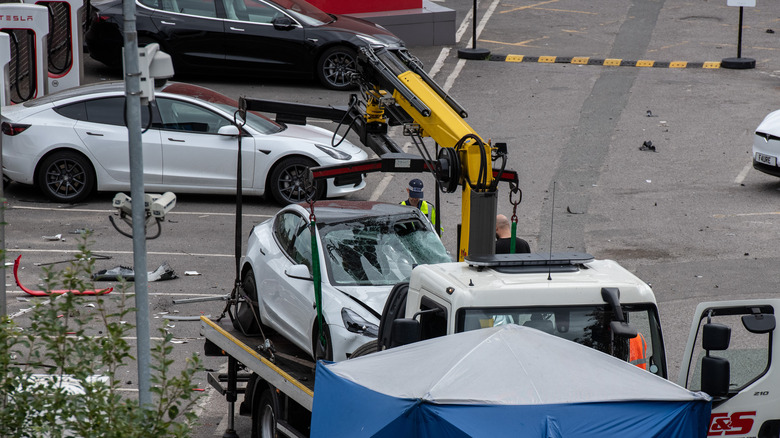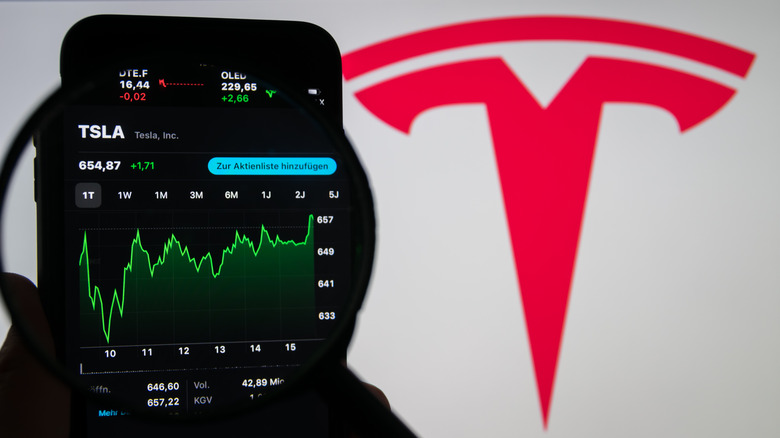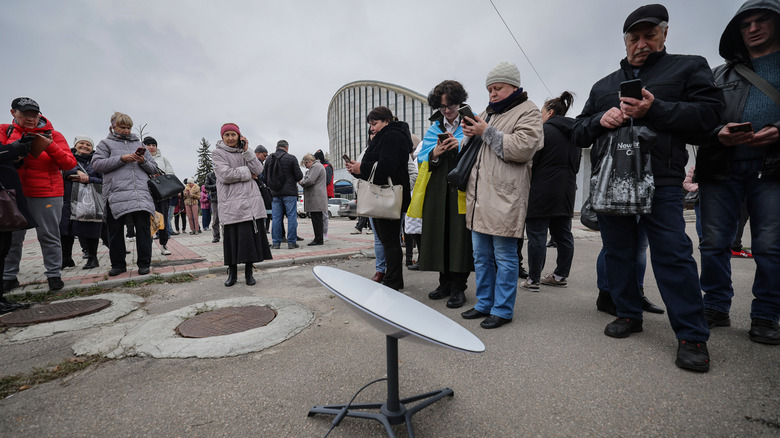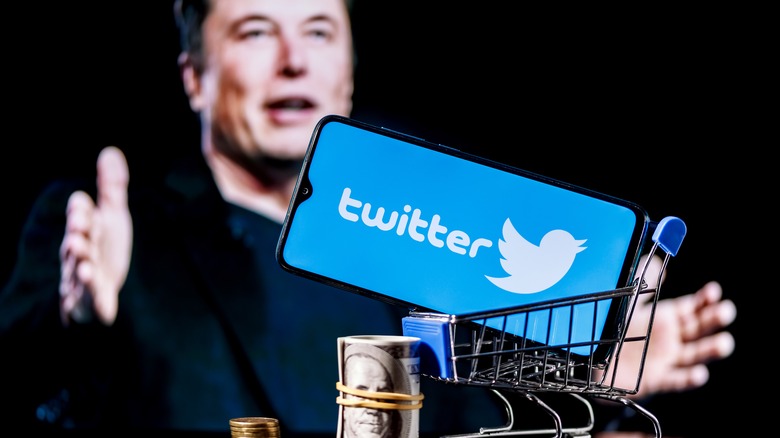Elon Musk's Biggest Tech Failures That No One Talks About
Elon Musk, at times the world's richest man, is certainly one of its most discussed. After making a name for himself at PayPal, he would go on to buy his way into the already-established Tesla Motors company, becoming an industry leader in electric vehicles. Unable to be constrained by Earth or its gravity, his next venture was SpaceX, and Musk became a leader in private space exploration.
For years, Musk was hailed as a visionary who would help end the era of fossil fuels and might even propel humanity to other planets. He was even a partial inspiration for the character of Tony Stark in the Marvel Cinematic Universe, to whom he has often been compared.
But with wild success comes wild failure, and Musk's past is riddled with it. From being forced out of his own company to costly business mismanagement, and even seeing his creations crash or explode, here are Elon Musk's biggest tech failures that no one talks about.
He was fired from PayPal
One of Elon Musk's earliest successes came with the financial services website X.com, which he founded by investing the money he'd made from his first company, Zip2, after it was purchased by Compaq. Musk founded X.com in 1999, and the company merged with tech vampire Peter Thiel's Confinity, which offered a money-transfer service called PayPal, but the combined venture retained the name X.com (via The Verge).
But there were stormy seas ahead for Musk. In September 2000, while Musk was on honeymoon with his first wife, Justine, a collection of employees at PayPal, dissatisfied with Musk's leadership, threatened to resign if Musk didn't step down as CEO. Executives delivered a vote of no confidence to the board of X.com, forcing Musk out and replacing him with Thiel. After Musk's departure, the company was renamed PayPal, and Thiel would later go on to sell it to eBay for $1.5 billion (via The New Yorker).
It was a rough early blow for the entrepreneur, but in the coming years, it would barely be remembered as a speed bump on his road to riches.
He waged war against a Tesla whistleblower
One of the least discussed but most revealing chapters in Musk's history came in 2018 when a Tesla assembly worker named Martin Tripp noticed some concerning things at Tesla's Gigafactory in California. Tripp identified a number of wasteful practices in production, so he brought his concerns to Musk, who proved unreceptive.
Tripp next brought internal Tesla documents to Business Insider, but in response, Musk waged war against the leaker, as detailed in a bizarre and harrowing Bloomberg investigation. He fired Tripp, then sued him for $167 million. He hired private investigators who tailed him in person and hacked his phone to see his texts in real-time. And, on his alleged orders, Tesla's security team passed along a "tip" to police claiming that Tripp was planning to commit a mass shooting at the factory. The SWAT team deployed to Tripp's house found him unarmed and sobbing.
Aside from being, to put it mildly, a bit of an overreaction, Musk's enraged response to Tripp's whistleblowing is a major failure for a tech CEO overseeing his own factory. As noted by CNBC, companies that are responsive to whistleblower concerns are ultimately more profitable in the long run. And, as we shall see, this would not be the last time Musk paid a price for ignoring the concerns of his workers.
Under his management, Tesla covered up safety violations, workplace injuries, and racism
In 2019, Forbes found that Tesla had been investigated by California OSHA 24 times between 2014 and 2018 and was fined for 54 violations. One worker lost a finger after his glove was caught in a torque gun. There were eight investigations at Tesla's Tennessee factory with five violations found, and the one in Kentucky was investigated 13 times with four violations issued. In 2020, the Los Angeles Times reported that Tesla had covered up hundreds of factory-related injuries since 2015.
Then, a judge ruled in April 2022 that Tesla must pay out $15 million to a Black contract worker who was systematically discriminated against inside the company (via NPR). And in July of that year, fifteen Black employees, both former and current, filed a lawsuit alleging they were racially harassed with slurs, compared to chattel slaves, and assigned to the most physically exhaustive labor while being passed over for promotions (via Al Jazeera).
Given Elon Musk's iron grip over his companies, noted by outlets like The Guardian, the buck stops with him. When factories are this chaotic, is it really surprising we have yet to see deliveries of the Tesla Roadster or Cybertruck?
Under his management, a shocking number of SpaceX rockets have exploded
After Tesla's success in the years after Elon Musk bought his way into the company, the billionaire's next venture left the road behind in favor of the stars. SpaceX, the private, Musk-controlled spacecraft and satellite manufacturer has become one of the leaders in space technology and was even the first private company to develop a liquid-propellant rocket that achieved Earth orbit when it launched the Falcon 1 in 2008 (via NASA). But despite its successes, a surprising number of SpaceX rockets have gone down in flames — according to the New York Post, at least 10 rockets have combusted between 2014 and 2021.
Indeed, many of SpaceX's rockets have become nothing more than incredibly expensive fireworks, such as a Falcon 9 that exploded over the Atlantic Ocean in 2015, costing the company an estimated $112 million according to Futurism. As reported by Reuters, another Falcon 9 carrying cargo bound for the International Space Station combusted two minutes after liftoff that same year. And among the most spectacular failures was a Falcon 9 rocket that exploded on the launch pad, a failure so mind-boggling to Musk that he — according to The Washington Post — investigated it as a case of sabotage.
At times, these technological failures can even present a threat to those of us who are terrestrially bound. According to The Guardian, in August 2022, two Australian farmers found debris from a SpaceX crash on their respective properties.
He got in trouble with the FCC over rigging Tesla stock prices with a joke
Elon Musk has always considered himself a bit of a troll, and nothing tickles his posting syndrome more than a weed joke. But in 2018, Musk's stoner antics backfired when he made what may just be the world's costliest 420 joke. On Twitter, the billionaire posted, "considering taking Tesla private at $420 a share." Laughs were had. Yuks were yukked. And then the Securities and Exchange Commission (SEC) got involved.
Musk's proposed share price may have been intended in jest, but he seemed serious about taking Tesla private, and his announcement, which suggested a valuation 11% higher than the current trading price at that time, caused a sudden spike in Tesla's stock prices and trading was halted by Nasdaq (via CNBC). The SEC charged him with civil securities fraud. Investors sued, and a judge ruled that Musk had made intentionally false statements; he had been lying, to begin with (via CNBC). It wouldn't even be the last time he messed with Tesla stock.
In 2019, Musk settled with the SEC, landing on an arrangement that included personally paying $20 million — pocket change for a man like Musk — and agreeing to have any tweets about Tesla vetted by the company's legal counsel before posting them, as reported by Reuters. Though it was regarded as a slap on the wrist by experts, Musk filed to kill the SEC deal in 2022, accusing the regulating body of violating his free speech (via Reuters).
Clearly, Musk is still chafing against the consent decree, but if there's one thing American businesspeople know, it's that regulators never take kindly to defrauding investors.
Under Musk's management, over 270 Tesla vehicles crashed on Autopilot in one year
While many of Elon Musk's technological failures represent setbacks for his companies or for himself, personally, others have had much more dire consequences. Nothing is more representative of that fact than the staggering number of Tesla cars that have been involved in crashes while in Autopilot mode. Between June 2021 and June 2022, a staggering 273 Teslas were involved in crashes while in Autopilot mode, accounting for almost 70% of crashes that involved driver-assistance systems according to the National Highway Traffic Safety Administration.
Tesla's Autopilot is, despite what its name suggests, not meant to drive the car fully autonomously. Rather, it is a suite of driver-assistance features that help the vehicle maintain speed, make safe lane switches, and the like. Although a beta of "Full Self Driving" mode is available on some models, it is not reliable enough to allow drivers to divert their attention from the road. But that doesn't stop some Tesla drivers from doing so anyway, perhaps trusting Musk's exaggerated promises about the technology (via The Verge). When that technology fails, the results can be deadly, which is probably why other auto manufacturers avoid such hyperbole about their own vehicles' self-driving capabilities.
He brought Tesla and SpaceX to the verge of bankruptcy
As the head of two companies that manufacture, respectively, automobiles and rockets, tech issues can be costly. And as the head of both Tesla and SpaceX, both companies came dangerously close to the precipice of bankruptcy under Elon Musk's leadership.
In the case of Tesla, the issues came while the company was in the production of its Model 3 electric sedan. As reported by CNBC, Musk shared on Twitter that, from mid-2017 to mid-2019, Tesla was within a month of bankruptcy as production on their vehicles stalled. The CEO named "production and logistics hell" as the culprit.
Then, in 2021, SpaceX nearly exploded into financial flames like a failed rocket launch. The problem was, similarly, production issues with its Raptor rockets. In a companywide email obtained by CNBC, Musk warned his employees at the space technology firm, "The Raptor production crisis is much worse than it seemed a few weeks ago. We face genuine risk of bankruptcy if we cannot achieve a Starship flight rate of at least once every two weeks next year."
Ultimately, both companies overcame their technological difficulties, and their respective near bankruptcies became another in a long list of Musk's least publicized failures.
His Starlink satellites became Russian military targets
Russia's invasion of Ukraine has dominated the 2022 news cycle, and Elon Musk plays a surprisingly key role in the ongoing conflict. Starlink satellites provided by SpaceX formed the backbone of Ukraine's communications network, helping its armed forces and civilians as Russia pummeled the country's ground infrastructure. The satellites were subsidized by the United States, though as The Washington Post suggests, SpaceX representatives have framed it as a charity operation.
Aside from their invaluable role in Ukraine's communications, the besieged nation uses the satellites provided by Musk's company to photograph Russian military deployments, review damage done to its enemy's air bases, and even provide grim evidence of mass graves in Russian-occupied territory (via Axios).
In September 2022, the Russian delegation to the U.N. General Assembly released a statement promising that "quasi-civilian infrastructure" could be a "legitimate target" if Ukraine continues to use them, almost certainly referring to SpaceX's Starlink Satellites, according to Futurism.
But as dire as the situation was, it was about to escalate due to Musk's own actions.
He threatened Ukraine but was forced to back down
In October 2022, as the Russo-Ukrainian war waged on, Musk abruptly threatened to cease funding the use of Starlink satellites by Ukraine, as reported by The Washington Post. Given the nation's heavy reliance on those satellites for its war efforts, such a move would have crippled Ukraine's defenses and provided a major tactical advantage to Russia.
Even more shockingly, the threat seemed to be a response to a Ukrainian ambassador who insulted him on Twitter. After Musk ran a Twitter poll suggesting the conflict be ended via a UN-supervised vote, and that the contested Crimea region remain part of Russia, Andrij Melnyk, Ukraine's ambassador to Germany, told Musk, "F— off is my very diplomatic reply to you." Shortly after threatening to cut Ukraine off from the Starlink network, Musk tweeted, "We're just following his recommendation."
But only a day later, Musk rescinded his threat, promising to continue funding with a bitter tweet that read, "The hell with it ... even though Starlink is still losing money & other companies are getting billions of taxpayer $, we'll just keep funding Ukraine govt for free" (via The New York Times). The Times speculated that Musk's about-face was in response to international rebuke for his threat, and noted that SpaceX had only donated 3,000 satellites to the Ukrainian effort, while the United States, the United Kingdom, and Poland footed the bill for almost 17,000.
The incident was a bizarre instance of a tech company becoming mired in international geopolitics, and the world may never know how close Musk came to handing Russia its desired annexation of Ukraine.
His management of Twitter is predicted to result in the loss of 32M users
While Twitter wasn't exactly in peak shape before Elon Musk took the reigns of the social media platform, his management since then has been chaotic to say the least, and market analysis now suggests those mistakes may be costly.
As SlashGear recently reported, market research firm Insider Intelligence is predicting a loss of 32 million Twitter users by 2024 due to Musk's layoffs at the company and a declining public perception of Musk himself. According to the report, Twitter's vastly reduced workforce will likely struggle to address technical issues, leading to user frustration and, ultimately, attrition.
Additionally, the report cites a proliferation of hateful content and a personal distaste of Musk as another reason users may choose to abandon the platform, a concern raised by other tech experts. As Nilay Patel at The Verge pointed out in an opinion column shortly after Musk marched into Twitter HQ with his sink in tow, social media may contain inbuilt mechanisms that help to proliferate extreme content, but users generally like their experiences to be pleasant.
As of this writing, Musk is in the process of suspending notable journalists from the platform, ostensibly for violating a new policy by posting the publicly available flight data of his private jet, which Musk claims is a personal safety risk. But while it's not clear how many of those journalists did so, many appear to have been critical of the "chief Twit" (via CNBC). In the immediate aftermath, many more media figures have declared their intention to leave Twitter for good. According to The Washington Post, Musk may also face sanctions from the European Union.
While the dire long-term projections are not the subject of widespread discussion, the decline of Twitter would be Musk's most visible tech failure yet.
